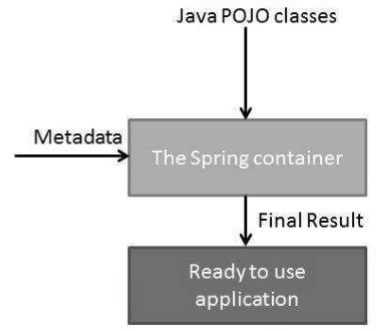
- Spring DI - Home
- Spring DI - Overview
- Spring DI - Environment Setup
- Spring DI - Create Project
- Spring DI - IOC Containers
- Spring Dependency Injection
Constructor Based Injection Examples
- Spring DI - Constructor Based
- Spring DI - Inner Beans via Constructor
- Spring DI - Collections via Constructor
- Spring DI - Collection Ref via Constructor
- Spring DI - Map via Constructor
- Spring DI - Map Ref via Constructor
Setter Based Injection Examples
- Spring DI - Setter Based
- Spring DI - Inner Beans Setter
- Spring DI - Collections Setter
- Spring DI - Collection Ref Setter
- Spring DI - Map Setter
- Spring DI - Map Ref Setter
Autowiring Examples
- Spring DI - Autowiring
- Spring DI - Autowiring ByName
- Spring DI - Autowiring ByType
- Spring DI - Autowiring Constructor
Factory Method
Spring DI Useful Resources
Spring DI - IoC Containers
The Spring container is at the core of the Spring Framework. The container will create the objects, wire them together, configure them, and manage their complete life cycle from creation till destruction. The Spring container uses DI to manage the components that make up an application. These objects are called Spring Beans, which we will discuss in the next chapter.
The container gets its instructions on what objects to instantiate, configure, and assemble by reading the configuration metadata provided. The configuration metadata can be represented either by XML, Java annotations, or Java code. The following diagram represents a high-level view of how Spring works. The Spring IoC container makes use of Java POJO classes and configuration metadata to produce a fully configured and executable system or application.

Types of IoC Containers
Spring provides the following two distinct types of containers.
| Sr.No. | Container & Description |
|---|---|
| 1 |
This is the simplest container providing the basic support for DI and is defined by the org.springframework.beans.factory.BeanFactory interface. The BeanFactory and related interfaces, such as BeanFactoryAware, InitializingBean, DisposableBean, are still present in Spring for the purpose of backward compatibility with a large number of third-party frameworks that integrate with Spring. |
| 2 |
Spring ApplicationContext Container This container adds more enterprise-specific functionality such as the ability to resolve textual messages from a properties file and the ability to publish application events to interested event listeners. This container is defined by the org.springframework.context.ApplicationContext interface. |
The ApplicationContext container includes all functionality of the BeanFactorycontainer, so it is generally recommended over BeanFactory. BeanFactory can still be used for lightweight applications like mobile devices or applet-based applications where data volume and speed is significant.